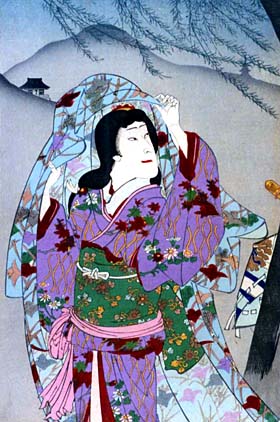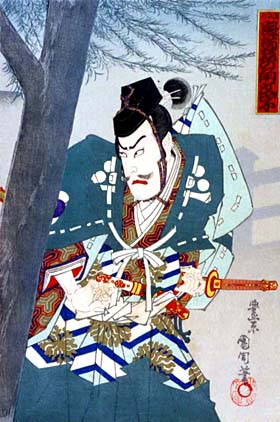| MODORIBASHI |
| Dance title | Modoribashi |
| Authors | Kawatake Mokuami (lyrics) Kishizawa Koshikibu V (music) Hanayagi Jusuke I (choreography) |
| History |
The dance-drama "Modoribashi" was premiered in October 1890 at the Kabukiza [casting]. |
| Key words |
Modoribashi Shinko Engeki Jûsshu Shitennô Shitennômono Shosagoto Tokiwazu Watanabe Tsuna |
| Summary |
"Modoribashi" has for hero Watanabe Tsuna, who meets a beautiful woman and discovers she is a supernatural creature. He pursues her into the air, fights with her, and at last as a climax cuts off her arm, after which he drops down upon the roof of a temple. The play is full of demon lore. The time of "Modoribashi" is a thousand years ago, and the place the Modori Bridge of Kyôto by moonlight. Watanabe wears one of those exaggerated costumes so characteristic of shosagoto, and looks cautiously at the bridge which is supposed to be enchanted. The long branches of a willow tree move as though a ghostly wind was blowing, although the curious-minded wonder how many stage assistants are pulling the strings down below, and the quick beating of a drum announces the approach of something uncanny. The female demon is in the guise of a beautiful maiden brilliantly arrayed, and she immediately makes advances to the warrior, who does not seem to be very anxious to accept the amorous overtures. The attitude of the two is exactly opposite to the conventional love scenes on the Western stage, where the maiden refuses and is hard-hearted, while the lover tries to gain her favour. The demon uses all her arts, but the warrior cannot easily be won over. Watanabe's flirtation with the devil woman in disguise continues until he leads her upon the bridge, and then looking down into the water he catches the reflection of her face and knows that she is not a human maid, but that she is his enemy and would lure him to destruction. The gradual change from a charming woman into a terrible devil is effected by changes in face, voice, and posture, a transformation that gives an actor with the weird for specialty a good opportunity. While the hero and the uncanny creature attack each other in a posture dance, the bridge disappears, drawn off by invisible hands behind the scenes, and a red-lacquered shrine is pushed partly into view and completes the very striking stage picture. The dance between the two becomes wilder and more intense, reaching a climax as the maiden darts behind the scene. Almost immediately she returns in her true shape, wearing a grotesque mask, while her mane is light brown, with a white stripe down the middle and so long it trails over the stage. She dances wildly about in a fight with warriors, whose swords glint in the semi-darkness of the stage; storm clouds hurry across the sky as though scurrying before a cyclone. A curtain of gauze representing clouds shuts off the view. The warrior and the creature he pursues are in mid-air struggling together right over the roof of a temple. He cuts off one of her arms, and clutches it wildly in triumphant posture while the mutilated devil woman disappears into the aerial regions. (Zoë Kincaid in "Kabuki, the Popular Stage of Japan") |
 |
 |
|
Onoe Kikugorô V and Ichikawa Sadanji I playing the role of the demon of Mount Atago (disguised as Sayuri) and Watanabe Genji Tsuna in the dance-drama "Modoribashi", which was staged in October 1890 at the Kabukiza (print made by Toyohara Kunichika) |
|
|
|
| Contact | Main | Top | Updates | Actors | Plays | Playwrights | Programs | Links | FAQ | Glossary | Chronology | Illustrations | Prints | Characters | Derivatives | Theaters | Coming soon | News |